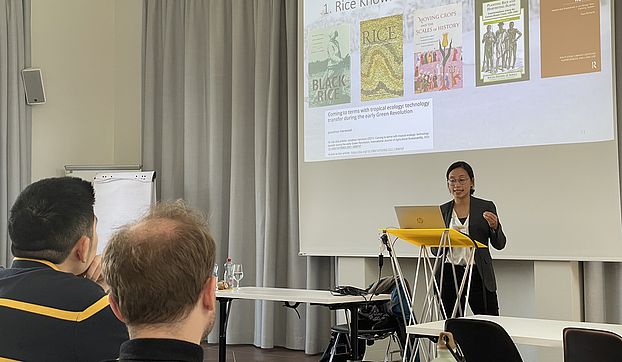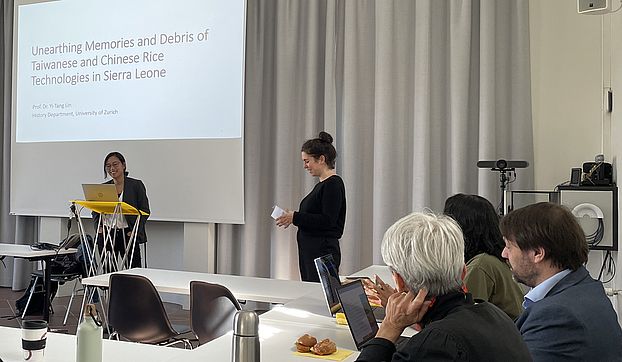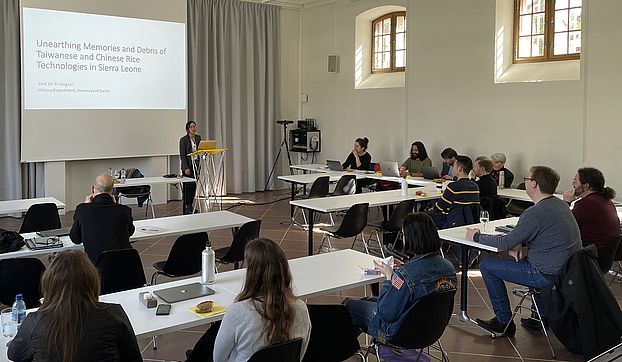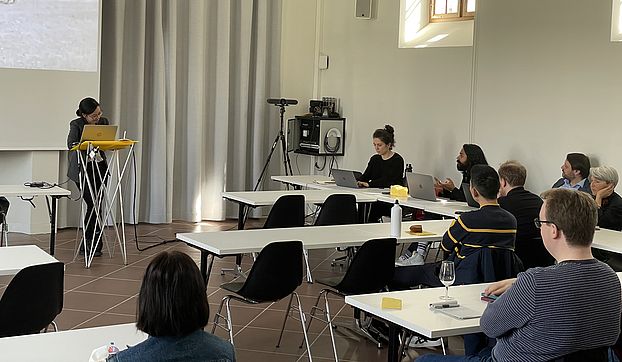/ News, Research
Working Lunch with Prof. Dr. Yi-Tang Lin on Rice Technologies between Taiwan and Sierra Leone
Yi-Tang Lin, PRIMA professor at the University of Zurich, gave a presentation titled “Unearthing Memories and Debris of Taiwanese and Chinese Rice Technologies in Sierra Leone” during a working lunch held on 19 March 2024. The event was organized by the Institute for European Global Studies.
Yi-Tang’s presentation introduced the audience to her new research project on rice knowledge and practices between Pacific Asia and West Africa in the period between 1960 and 1991 and presented first insights from recent fieldwork in Sierra Leone. Yi-Tang presented the existing historiography on the “Green Revolution” and argued that the perspective of Asian-African collaboration as well as a focus on rice, a crop that is particularly important for communities in the two regions, is missing from the discussion. By looking at the collaboration between East Asia – namely China, Taiwan and Japan – and West Africa – namely Sierra Leone and Côte d’Ivoire – in the context of the Cold War and of technology, farming and rice consumption more broadly, her project aims to fill this gap. Moreover, the project seeks to decentralize historical accounts of the Cold War-era “Green Revolution” by looking at an example of South-South collaboration and challenging the notion of two regions considered only recipients of aid rather than actors in these exchanges. The project focuses on three sets of actors, namely scientists and farmers from both Sierra Leone and Côte d’Ivoire, development agencies from China, Taiwan and Japan and, at the international level, international agricultural research centers. It is based on multi-archival work, database analysis and site-based oral history.
Based on her recent field work on the Rokupr research center and other sites in Sierra Leone, Yi-Tang showed how the Taiwanese government, under the name of the Republic of China, attempted to influence rice production in West Africa in the 1960s. She argued that the Taiwanese presence in Sierra Leone can be described as an ‘international development cropscape’, where agricultural collaboration was driven by diplomatic aims and efforts and interacted intensively with the local environment. She highlighted that both the Taiwanese and the successive delegations from the People’s Republic of China had direct influences on the rice production system on the ground. She gave examples of small dams, bird-scaring technology and agricultural equipment that were introduced at various sites in Sierra Leone.
Yi-Tang concluded that the international agricultural research centers acknowledged Taiwanese success in double cropping in Sierra Leone to justify that African soils were adapted for intensive farming. However, paper trails also indicated these centers were reluctant to opt for Chinese rice seeds, as the yield decreased when the delegation left, and the centers knew very little about these seeds. Yi-Tang argued that the longevity of rice knowledge and techniques at the local level followed diversified patterns and should be fully considered in the historiography of Green Revolution.
In the Q&A, the discussion focused on the particularities of the South-South relationship between Sierra Leone and Taiwan and the contribution of the project to the existing literature on the Green Revolution as well as the continuities and discrepancies between colonial and Cold War development projects.
Yi-Tang Lin is PRIMA Professor at the University of Zurich, Switzerland. In her current research project "Rice Knowledge and Practices between Pacific Asia and West Africa: International Development meets local farming (1960–1991)", she analyzes knowledge and practices flows between East Asia (China, Japan, Taiwan) and West Africa (Sierra Leone and Côte d’Ivoire). The project is funded by the Swiss National Science Foundation.




